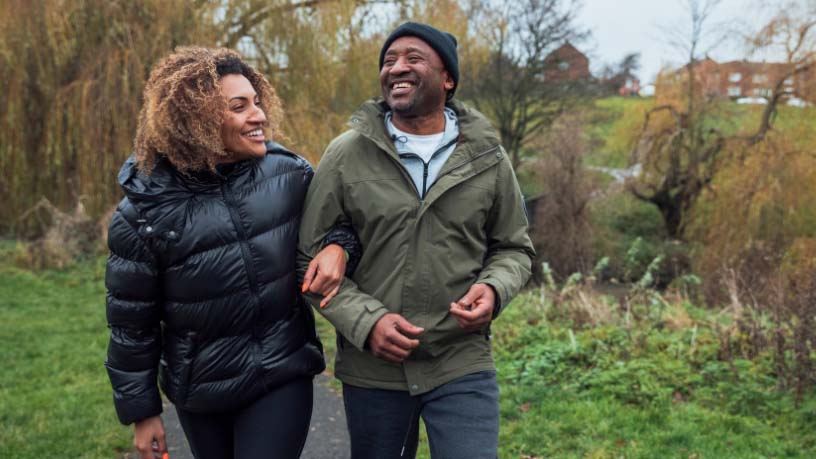Knee surgery can take several months to recover from. It can also be painful.
Key takeaways
Recovery involves temporary lifestyle changes, including getting support from others.
Follow the recommendations of your treating team to ensure a speedy, effective recovery.
Knee surgery can have a major impact on your life. No matter how prepared you feel going into it, the months that follow can be tough, both physically and mentally.
Here, we share 7 common insights gathered from those who’ve been through knee surgery, including tips on recovery and what you should know beforehand.
1. Recovery is slow
While different for everyone (and depending on your operation), recovering from knee surgery can take several months, or even longer.1
It may catch you by surprise how long it takes to start doing simple tasks around the home, get back to work and, importantly, bend your new knee. So, it’s important to have honest conversations with your surgeon, GP and physio before your surgery to set realistic expectations and goals for your recovery.
2. The pain can be intense
While knee surgery is a common procedure, it can still be a major trauma to your knee area and recovery can be both slow and painful. That said, 9 out of 10 people who have a knee replacement report less pain and more mobility in the long term.2
Your treating team will give you advice on how to best manage your pain. It’s important to remember to not overdo it. During your recovery, you may need to keep your knee elevated, regularly apply ice and take pain medication as prescribed.
3. Pain medication can cause side effects
Managing pain after knee surgery is key to enabling you to walk around, which is important for recovery.3
If pain is severe, you may be prescribed oral opioid pain relievers in the days following your surgery. They’re often prescribed with other, more familiar pain relievers like paracetamol and ibuprofen to help keep the opioid dose down. However, some people still experience opioid side effects, such as constipation, drowsiness, nausea and vomiting. Opioids can also be addictive.4
Immediately speak to your treating team about any worrying reaction you experience while taking pain relievers.
4. The mental impact is real
Moving around freely is something most of us take for granted in our lives. So, being somewhat immobilised for an extended period may be difficult to cope with.
The psychological impact of a physical injury shouldn’t be overlooked. It’s not uncommon to feel isolated, moody or lonely after surgery. But remember, it won’t last forever.
If negative feelings are overwhelming you, speak to your GP.
5. Rehab is intensive
While everyone’s rehabilitation program is different, it will usually be intensive, particularly in the early days. It’s important to commit to your physio’s exercise plan for at least 2 months after your surgery. Depending on your operation, age, general health, weight and goals, you may need to continue physiotherapy for up to a year.
6. Support is needed
If you’re someone who doesn’t like to ask for help, you may have to face the fact that you’ll need some support during your recovery.
Think about basic, everyday tasks and consider how you would manage if you were unable to bend your knee. This might include getting in and out of a chair, going to the toilet and driving. Try to put your pride aside and make sure you have help on hand.
Bupa Health Programs
Discover our programs designed to help you recover and stay out of hospital where you can.
7. Exhaust other options
Knee surgery is a big deal, and it should only be undertaken when all other options have been exhausted. Your specialist will only recommended it for a reason.
In some cases, weight loss, strengthening exercises and medication can address your knee issues on their own.5 Other support includes physiotherapy and mobility aids.
These options may reduce pain and help you avoid surgery. They’re also great ways to set you up for success when surgery is necessary.
Resources
The Australian Physiotherapy Association can help you find a physio near you.
Chronic Pain Australia provides education and support for those living with chronic pain.
Musculoskeletal Health Australia provides information and support for people living with arthritis and musculoskeletal conditions. Visit their website or call them on 1800 263 265.

At Bupa, trust is everything
Our health and wellbeing information is regularly reviewed and maintained by a team of healthcare experts, to ensure its relevancy and accuracy. Everyone's health journey is unique and health outcomes vary from person to person.
This content is not a replacement for personalised and specific medical, healthcare, or other professional advice. If you have concerns about your health, see your doctor or other health professional.
1National Health Service. (2023). Recovering from a knee replacement. National Health Service.
2Better Health Channel. (2017). Knee replacement surgery. Victoria State Government, Department of Health.
3Sheth, N. P. & Foran, J. R. H. (2022). Total Knee Replacement Exercise Guide. American Academy of Orthopaedic Surgeons.
4Healthdirect. (2023). Pain-relief medicines. Healthdirect.
5Johns Hopkins Medicine. (2023). Knee Replacement Alternatives to Consider. Johns Hopkins Medicine.
You might also like...
7 things I wish I knew before knee surgery
Knee surgery is a major operation that may require months of intensive recovery. Discover 7 common insights from those who’ve done it.
Knee surgery: The reality of rehab
Recovering from knee surgery looks different for everyone. Find out about the reality of rehab from 2 people who’ve been through it.
Knee osteoarthritis: The basics
Osteoarthritis is a joint disease that commonly affects the knee, so make sure you know the symptoms, causes and treatments that are available.
5 best exercises to strengthen your knee after surgery
If you’ve had knee surgery, support your recovery with these 5 physiotherapist-approved exercises. Regain strength and mobility safely at home.





